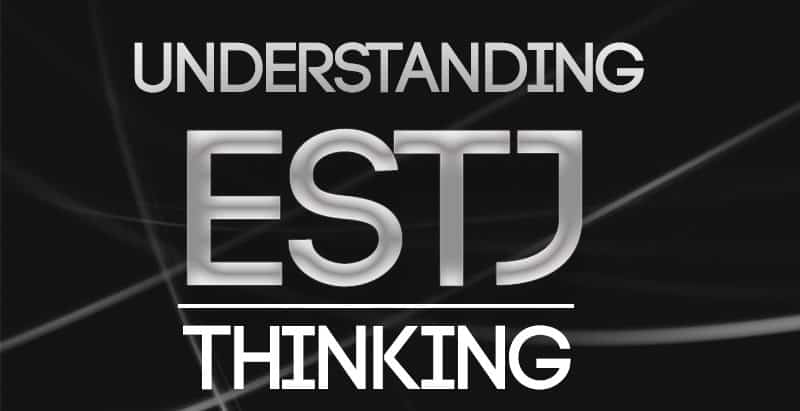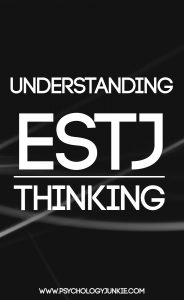Understanding ESTJ Thinking
“I think it’s important to do a good job and not to feel that you’ve got to make grand gestures, but just to get on and deliver.”
– Theresa May, an ESTJ
ESTJs are known for their responsibility, determination, and practicality. These strong individuals combine swift-decisiveness with an attention to detail that makes them excel in leadership positions. They are recognized by their straightforward nature, their ability to efficiently get jobs done, and their down-to-earth demeanor. ESTJs excel in a variety of career fields, but you’ll find many of them in politics, management, administration, and law enforcement. Famous ESTJs include Michelle Obama, Billy Graham, Tom Clancy, and Alec Baldwin.

“As a child I was the one who raked the leaves and cut the grass and shoveled the snow and cleaned the dishes. My brothers were like hillbillies. They had no sense of responsibility.”
– Alec Baldwin, an ESTJ
If you know an ESTJ, what you’ll see most readily is their dominant function, Extraverted Thinking (Te). They also use Introverted Sensing (Si), Extraverted Intuition (Ne), and Introverted Feeling (Fi). This article is mainly going to discuss their dominant thinking function.
Because ESTJs rely primarily on thinking and sensing, when you’re with them you’ll know that they run a tight ship. They are often in leadership positions and working in their communities to improve and promote growth. You may see them organizing charity events, coaching a little league softball team, or helping out in the neighborhood watch. Doing their part and responsibly improving the community is very important to ESTJs. They don’t believe in laziness or fading into the background while other people do the hard work. They are not afraid to roll up their sleeves and make sacrifices to help out in their towns, churches, schools, or workplaces.
Not sure what your personality type is? Take our new personality questionnaire here. Or you can take the official MBTI® here.
Understanding Extraverted Thinking

Extraverted Thinking (Te) is the dominant function of the ESTJ and the ENTJ. Te-dominant personality types are excellent at organizing, directing, and improving systems. They can quickly look at an operation and see its flaws and how it can be optimized. They are masters of efficiency and reasoning who have no patience for “sugarcoating” anything. They may not be the most sympathetic, bubbly individuals out there, but they’re honest and you can count on them to be true to their word.
ESTJs combine Te with their auxiliary Introverted Sensing (Si) function. The combination of Te and Si gives the ESTJ a knack for seeing practical ways to bring a plan together and make things work. They can easily recall facts, see the important details, and ensure that their projects are finished in a timely manner. Laziness and wishy-washy behavior are anathema to the ESTJ. If they say they’re going to do something you can count on them to do it.
Because the ESTJ uses introverted sensing, they tend to rely on tried-and-true techniques and personal experience to complete tasks. They usually have a selection of manuals and “how-to” books in their library and are ready to share the advice they’ve learned with anyone who needs a helping hand.
Carl Jung said of the Te-dominant type, that they will “by definition, be a man whose constant endeavor…is to make all his activities dependent on intellectual conclusions, which in the last resort are always oriented by objective data, whether these be external facts or generally accepted ideas. This type of man elevates objective reality, or an objectively oriented intellectual formula, into the ruling principle not only for himself but for his whole environment.”
ESTJs trust the facts, they trust evidence, and they trust what they know through firsthand exposure. You can count on them to be fair because they strive to remain as unbiased as possible. If you want a rational, straight-forward answer to a problem, personal or otherwise, you can depend on them to give you direct, practical, sensible advice.
When it comes to problem-solving, ESTJs tend to break the problem down into many parts. Afterward they label those parts and spell out how to solve the problem using clear, sequential directions. They will often use charts and diagrams to show visually how a project can be completed or a problem can be resolved. One of the reasons ESTJs make such great leaders is because they are excellent at deploying clear, step-by-step instructions to ensure that not only is the job done easily, it’s done accurately.
Characteristics of ESTJs:
– They are down-to-earth and grounded in reality
– They are usually responsible and honest
– They are logical and objective
– They collect a large number of facts
– They are decisive and enjoy planning.
– They value truth, facts, formulas, and credentials
– They prefer to be in leadership positions
– They are good at delegating and organizing
– They focus on efficiency
– They are strict with themselves and others
– They are detail-oriented
The Neuroscience of Extraverted Thinking

UCLA professor and expert in neuroscience, Dario Nardi, says in his book The Neuroscience of Personality that ESTJs “show efficient use of mental energy as they rely on evidence-based decision-making….The Te types focus on goals and are stimulated by task completion and error correction.” Nardi also says that Te-dominant personalities are “less excited about the minutia of implementing goals and prefer to direct others to do so.” This is why Te-dominant personalities are tailor-made for the executive and political realm. They can effortlessly spot inaccuracies, flaws, and roadblocks to achieving goals and ensure those flaws and issues are corrected.
Nardi also noticed that ESTJs exercise good hand-eye coordination, absorb factual and numeric details, and speak with clarity “with few “whatchamacallits”, and tend to arrange information spatially, using charts, tables, and diagrams.”
There is a lot more information about type and neuroscience in Dario Nardi’s book, Neuroscience of Personality: Brain Savvy Insights for All Types of People.
Are ESTJs “Bossy”?

I see ESTJs get a bad rap in the MBTI® community quite a bit. There are a lot of people who see the decisive, sharp-shooting nature of the ESTJ and are quick to label them as “controlling” or “bossy”. Why does this happen so much?
ESTJs tend to see the world in black-and-white and absolutes. There’s a right or wrong way to do things in their minds, and the most efficient way is almost always the right way. The ESTJ is naturally wired to critique as well. Extraverted Thinking automatically picks up on corrections, flaws, and inaccuracies. This means that Te-dominant types tend to come across as critical simply because they are programmed to spot these errors and find a way to fix them (often by giving advice or direction). While this might make them seem critical, they rarely mean to seem “bossy”.
It can be frustrating for ESTJs to be labeled as controlling because they genuinely enjoy positive teamwork. They often show that they care by helping people see more efficient, logical ways of doing things. This can be misconstrued as controlling, and unhealthy ESTJs can actually be controlling. But healthy ESTJs don’t desire to control or dominate other people, they are simply being themselves and trying to give helpful advice or suggestions.
Because ESTJs don’t have Extraverted Feeling (Fe) in their function stack, they can struggle with knowing how to frame suggestions and advice in a way that will be more readily accepted by feeling-oriented individuals. ESTJs despise “sugarcoating” or anything that gets in the way of getting straight to the point. They want people to be direct and forthcoming with them, and they will give the same respect to people they care about.
One of the wonderful things about the ESTJ is that they are rarely underhanded or deceitful. They’re not the types of people to be nice to your face and talk badly about you behind your back. You’ll know how they feel about you, and if you are part of their “inner circle” they are incredibly faithful, loyal, and helpful.
ESTJ Values

What many people don’t realize is that ESTJs are greatly motivated by their internal values. When they make decisions they will try to focus on the objective facts and the logical approach, but their inferior Introverted Feeling (Fi) is actually quite powerful. Many ESTJs will try to find some way to “meld” their value-driven causes with their long-term goals. Theresa May, the U.K. prime minister, has campaigned to support hospitals and underprivileged communities, Michelle Obama has focused on numerous children and women’s rights causes, my ESTJ mother-in-law is a midwife who has helped hundreds of women have the home-birth they want. While ESTJs may seem to be all about the cold hard facts, they actually have very private, internally held values that grow and mature with time. It’s not unusual for ESTJs in their 50’s and 60’s to become much warmer, more emotionally aware, and more driven by their personal values.
“Tears shed for self are tears of weakness, but tears shed for others are a sign of strength.”
– Billy Graham, an ESTJ
“I have learned that as long as I hold fast to my beliefs and values – and follow my own moral compass – then the only expectations I need to live up to are my own.”
– Michelle Obama, an ESTJ
Fun Facts About ESTJs
These facts are taken from the MBTI® Manual – Third Edition
– In a study on type and conflict, ESTJs tended to compete to deal with conflict.
– ESTJs are overrepresented among both male and female business owners.
– ESTJs are overrepresented among working MBA students compared with national sample.
– To ESTJs, the most important feature of an ideal job is ” A stable and secure future”.
– ESTJs are the most frequent type among school administrators.
– ESTJs are among the highest of all personality types in college retention.
– In school, ESTJs prefer the subjects of math and practical skills.
Have Any Questions?
Feel free to ask me in the comments!
Find out more about your personality type in our eBooks, Discovering You: Unlocking the Power of Personality Type or The INFJ – Understanding the Mystic. You can also connect with me via Facebook, Instagram, or Twitter!

Sources:
Want to know more about ESTJs? Check out these amazing books!
Gifts Differing: Understanding Personality Type
MBTI Manual: A Guide to the Development and Use of the Myers-Briggs Type Indicator, 3rd Edition
Neuroscience of Personality: Brain Savvy Insights for All Types of People
Creative You: Using Your Personality Type to Thrive

Subscribe to Our Newsletter

Want to discover more about personality type? Get the inside scoop with Susan Storm on all things typological, along with special subscriber freebies, and discounts on new eBooks and courses! Join our newsletter today!











Math??? Lol no. Clearly a non ESTJ wrote this. Entj, maybe like math. Estj hates algebra and nonsense math that isn’t logical. I took algebra 3times because I refused to try to memorize things that weren’t logical and clear. I just refused to do it. Didn’t do the homework, etc. Estj get geometry because it makes sense and is logical. But generally dislike math. We love art, poetry, English, writing, theater, fashion, etc. We are very creative types.
You are not an estj lol
I am the daughter of an ESTJ and I can confirm this. My dad is an ESTJ and he told when I was younger that he never liked math. He preferred geography, art, history or music as subjects. I’m not saying that all ESTJs don’t like math, but all ESTJs I KNOW are not really fan of that.
Wow, you look like you’re the center of earth. This is generalization. You may be ESTJ but doesn’t that mean your experience is absolute to type.
Otherwise, maths are logic. If you don’t understand the subject or your teachers didn’t teach you correctly that’s another hole. All the subjects you said you enjoyed, aren’t typical of ESTJ. Be aware you can be mistyped. Take a look on unhealthy ESTJ also to ESTJ thinking pattern, but i recommend you to think about FP or SF.
Hello! Theresa May is not ESTJ.
Ahhh…she may not be. I need to re-analyze her, thank you for bringing that up!
Lol. Im an ESTJ and im not creative at all. My room looks like a depot, my poems sound like shit. Math Chemestry and Physics are my best subjects.
Chemistry*
I’m an ESTJ & I really enjoy math, it’s logical, it makes sense, it’s black and white, no gray area. I’m Taking Calculus II at the moment studying civil engineering. I don’t enjoy Physics yet, but I’m warming up to it. Chemistry was one of the worst experiences for me & many of my engineering similar personality friends, dang conceptual thinking, give me something practical or something I can see.
My creativity isn’t there I’ll give you that. Not the most artsy, creative person but I’m logically & systematicallu working on strengthening that part of myself.
Room should be super organized. As a logical organized personality I couldn’t see (for the most part) things set aside every where room unorganized. That would drive me nuts give me OCD lol,
my brother can’t do math to save his life and is a cheat he married his new wife when he was overseas after barely knowing her and his kids really loved that lol. I will give him credit…he could gets things done being bossy and always has a good job.